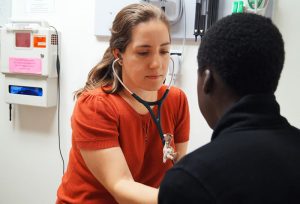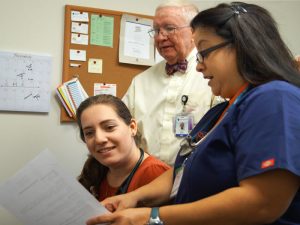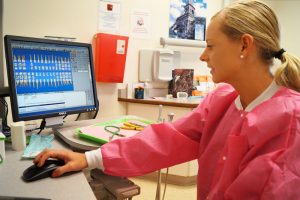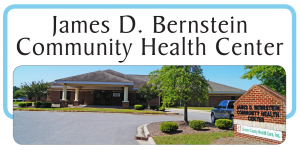Built and owned by Access East, Inc., the James D. Bernstein Community Health Center provides high-quality primary medical and dental services to principally low-income and uninsured patients from Pitt and neighboring counties.
“(The) facility is state-of-the-art, with first-class equipment,” notes Dr. Tom Irons, Access East Chief Medical Officer, and Associate Vice-Chancellor for Health Sciences and Professor of Pediatrics at East Carolina University.
Irons led efforts to fund construction and equipping of the center back in 2007. He is seen in the middle of the group in the center picture, below, back when he was still actively contributing medical services at the clinic.
This 15,000-square-foot federally qualified health center (FQHC), located near the intersection of N.C. 33 and N.C. 11 just north of Greenville, is operated by a strong regional partner, Contentnea Health Care (CHC), formerly Greene County Health Care, Inc.



A True Community Health Center
CHC is well-positioned to provide superior safety-net services, keeping Bernstein open and operational, and staffed with primary-care, dental, and pediatric staff with a keen understanding of the facility’s historically underserved patient-base (several CHC staff members are seen in the photos, above). Many Bernstein staff members are also bilingual, an essential component for working successfully with a primarily rural population in Eastern North Carolina.
The Snow Hill-based CHC also runs three other primary-care sites and another dental care site, along with a school-based health clinic, all invaluable in providing this region’s most vulnerable with affordable, accessible quality healthcare.
Among the additional ongoing community collaborations that make the Bernstein Center such a vital regional resource: Greenville’s ECU Health Medical Center, a strong supporter of the facility since it opened, and Pitt Community College, providing on-site no-cost life-skills classes, as well as GED classes.
The Bernstein Center accepts a wide range of insurance, in addition to its work with uninsured patients, who are seen on a sliding-fee scale. All patients who come in are, however, seen regardless of insurance status.
That can keep things pretty challenging, Irons admits, but CHC "has operated at a high degree of efficiency through trying times.
“We’re very, very proud of (the) place,” he adds warmly.

